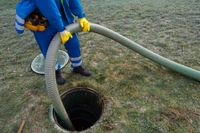
Commonly found in rural communities, a septic system handles all of the waste flowing from a household. Each system includes a septic tank and perforated pipes leading to an adjoining drain field. Household waste enters the tank from plumbing pipes, where it separates. Floatable matter, such as oils and fats, rise to the top, while solid waste sinks to the bottom, forming sludge. Wastewater exits the tank through the perforated pipes, where it filters naturally through the soil in the drain field to prevent groundwater contamination. If you are considering septic tank installation, consider the following maintenance information.
4 Common Questions About Septic Tanks
Where is my tank located?
If your tank lid is not visible above ground, get a copy of your property’s septic system records from your local municipality. Use small stakes or other identifying markers, so everyone in your household knows where the tank is located. Parking over the septic tank increases pressure and can potentially cause cracks and leaks. Leaking tanks often result in saturated drain fields and groundwater contamination, among other expensive complications.
How often should I get my tank pumped?
 Get your septic tank pumped every two to five years, depending on how many people live in your home and how much water you use every week. Heavy water usage overwhelms tanks and could possibly result in solid waste entering the drain field. Overly full tanks can also crack and leak. Luckily, regular cleaning will prevent the septic tank from becoming overloaded with sludge, which can cause tank leaks and damage.
Get your septic tank pumped every two to five years, depending on how many people live in your home and how much water you use every week. Heavy water usage overwhelms tanks and could possibly result in solid waste entering the drain field. Overly full tanks can also crack and leak. Luckily, regular cleaning will prevent the septic tank from becoming overloaded with sludge, which can cause tank leaks and damage.
How will I know the tank needs to be cleaned?
When a tank can no longer accommodate incoming waste, it backs up into household drains and toilets. Signs that it’s time to schedule a tank cleaning include sewer odors emanating from drains, toilets, or the tank itself, as well as gurgling pipe sounds and slow drains. Overly-lush grass covering your drain field is another clue, as it indicates a surge in wastewater flow.
What can I do to prolong the system’s life span?
Stay mindful of weekly household water usage to avoid overwhelming your tank. For example, try spreading the laundry over several days instead of doing three loads in a few hours. Also, watch what you flush and put down your drains, as anything other than human waste and toilet paper, including cigarette butts, coffee grounds, and household cleaning chemicals, can interfere with the tank’s natural bacteria count. Avoid flushing paper towels, tissues, Q-Tips®, or feminine products, as they can clog the tank.
For help with your septic system, call Earnest Well Drilling in Milford, NE. With a reputation for high-quality service and reliability, they specialize in septic tank installations, repairs, and cleanings. This trusted family company has served Seward County for over 90 years. Call (402) 761-2281 today to request an estimate or visit the business online for service details.
About the Business
(4 reviews)
Have a question? Ask the experts!
Send your question

